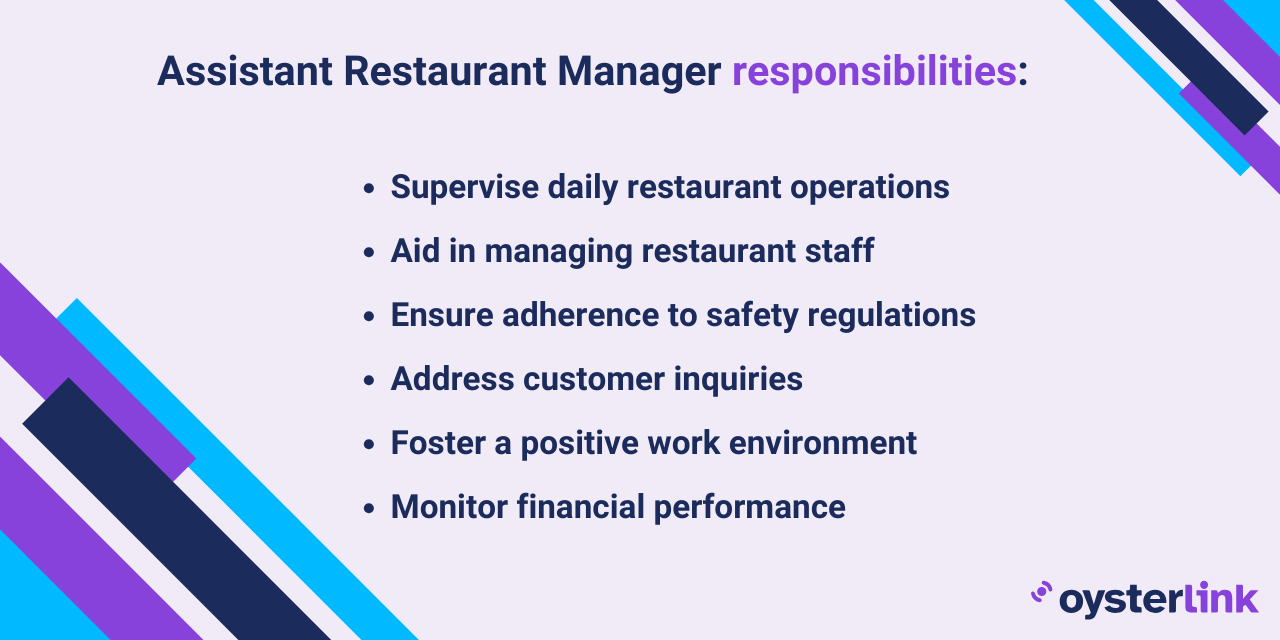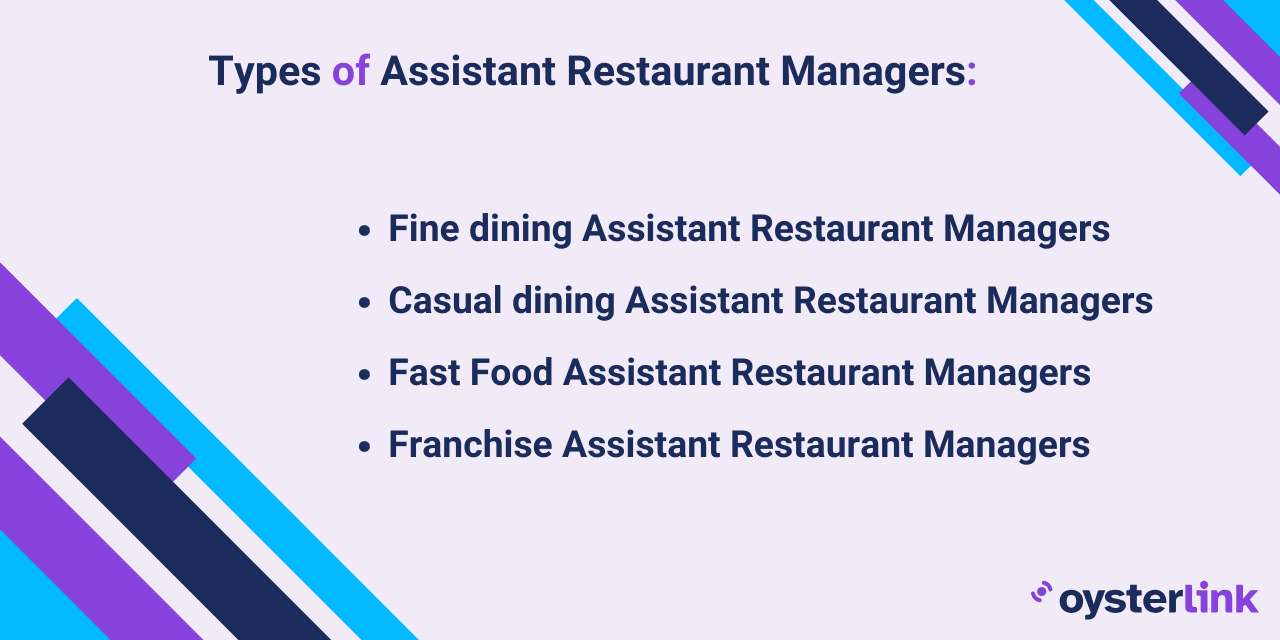Becoming an Assistant Restaurant Manager is an excellent way to progress in the hospitality industry.
This role pays well compared to other front-of-house roles such as Host/Hostess. It is an excellent stepping stone to more senior roles such as the Restaurant Manager role and anyone looking to become a Director of Restaurant Operations.
Our Assistant Restaurant Manager career overview will tell you everything you’ve ever wanted to know about this role. If you’re thinking about becoming an Assistant Restaurant Manager, use this guide to see the ins and outs of this role.
What Is an Assistant Restaurant Manager?
The Assistant Restaurant Manager is someone who’s in charge of the restaurant and oversees most day-to-day operations. They are second only to the Restaurant Manager and they take over during the Restaurant Manager’s absence.
Think of the Assistant Restaurant Manager as the most versatile employee in the restaurant. They deal with both staff and customers, making sure restaurant activities remain uninterrupted.
What Does an Assistant Restaurant Manager Do?
The Assistant Restaurant Manager’s main job is to manage the restaurant and its staff. They must ensure that there are no operational delays or internal conflicts and that the customers are happy.

The duties of the Assistant Restaurant Manager can be subdivided into duties regarding the employees, the customers and the operations of the restaurant itself.
Main Tasks of an Assistant Restaurant Manager
Most Assistant Restaurant Managers like to joke that no two days are the same in their profession. However, some of their core duties and responsibilities are:
- Supervising daily operations of the restaurant
- Scheduling shifts
- Assigning tasks to front-of-house staff members
- Opening and/or closing the restaurant
- Recruiting and training new front-of-house employees
- Answering customer questions
- Dealing with customer complaints
- Balancing cash registers
- Overseeing payroll
Top 4 Assistant Restaurant Manager Skills and Qualities
To become an Assistant Restaurant Manager you should possess these four skills above all else:
1. Verbal communication
If you become an Assistant Restaurant Manager, you’ll spend most of your day communicating with staff to delegate tasks and resolve conflicts. You’ll need to give clear instructions and be able to solve issues as they arise.
A good portion of your day will be spent answering customer questions or taking feedback/complaints. This requires having excellent verbal communication skills and a trustworthy character.
2. Attention to detail
The Assistant Restaurant Manager has to have amazing attention to detail. Nothing should go unnoticed by them.
Quality control and adherence to health and safety regulations both fall under the Assistant Restaurant Manager’s jurisdiction. A keen eye can spot issues in these areas and address them sooner rather than later.
Because the Assistant Restaurant Manager is also responsible for inventory management and supporting payroll, being good with numbers is another major benefit.
3. Time management
Restaurants are busy and hectic most of the time. For an Assistant Restaurant Manager to thrive, they have to manage their time well and keep a tight schedule.
Since their responsibilities basically call for juggling between different tasks – most of which are time-consuming – a great Assistant Restaurant Manager has to know where he should focus his attention and when.
4. Teamwork and collaboration
Teamwork among employees is vital in most jobs, but nowhere is this more apparent than in hospitality. Without collaboration and communication, a restaurant can’t function.
This is where the Assistant Restaurant Manager comes in. By leading by example, such as delegating tasks or helping out wherever needed, the Assistant Restaurant Manager can create a collaborative team environment where everyone has to contribute equally.
How To Become an Assistant Restaurant Manager: Education and Training Requirements
Becoming an Assistant Restaurant Manager typically requires a combination of education, experience and skills.
The first thing you’ll need to have is experience in the restaurant industry as a front-of-house staff member. Very few companies would hire a complete industry newbie as their Assistant Restaurant Manager.
Here are some of the most common jobs that people have before transitioning into an Assistant Restaurant Manager:
Although having formal education is often not a prerequisite for getting a job as an Assistant Restaurant Manager, some employers value candidates with relevant certifications (such as a Food Safety Manager Certification).
Here are five certifications and courses for Assistant Restaurant Managers you can complete to gain valuable skills and knowledge.
| Organization/Institution | Certification/Course | Description |
|---|---|---|
| ServSafe | ServSafe Manager Food Safety Certification | Provides Assistant Restaurant Managers with food safety knowledge to protect customers from foodborne illness; valid for up to five years |
| National Registry of Food Safety Professionals (NRFSP) | Food Safety Manager Certification | Helps Assistant Restaurant Managers enhance their food safety skillset; valid for up to five years |
| International Food Service Executives Association | Certified Food Manager Certification | Focuses on the skills needed by Assistant Restaurant Managers aiming for higher-level restaurant jobs; valid for up to three years |
| Penn Foster | Hotel and Restaurant Management Career Diploma | A comprehensive online program that covers staff recruitment and management, proper food handling, menu planning and more |
| Università Bocconi (via Coursera) | Food & Beverage Management Course | A free online course with certification that helps Assistant Restaurant Managers gain an advantage through food marketing skills |
Read our Assistant Restaurant Manager job description to learn what skills and education level employers prefer in greater detail.
Assistant Restaurant Manager Wage and Earning Potential
The average base salary for an Assistant Restaurant Manager in the United States is $24.41 per hour. You can see how Assistant Restaurant Manager salaries vary in our in-depth salary guide.
Where Do Assistant Restaurant Managers Work?
Assistant Restaurant Managers can work in various establishments, ranging from small, family-owned restaurants to large hotel chains.
Here are some common establishments where you can work as an Assistant Restaurant Manager:
- Restaurants
- Hotels and resorts
- Private clubs and membership lounges

What Is the Workplace of an Assistant Restaurant Manager Like?
The short answer is: hectic and fast-paced. There’s very little downtime when managing a restaurant, and the Assistant Restaurant Manager is always busy doing something.
If you don’t mind an environment where you have to be on your toes most of the time, you will likely enjoy being an Assistant Restaurant Manager.
Pros and Cons of Being an Assistant Restaurant Manager
Just like any other job, being an Assistant Restaurant Manager has its pros and cons. Here are some of them.
Pros:
- Career development. You can work your way up the corporate ladder into a more senior role.
- Potential for bonuses and promotions. If you’re meeting your KPIs, you can always get a hefty payout in the form of a bonus.
- Networking in the hospitality industry. Meeting people in the industry could help you further down the line when you’re looking to switch companies or even careers.
- Flexible working hours. You won’t have to work a regular 9 to 5 shift, so you’ll have plenty of flexibility when it comes to your schedule.
Cons:
- Long working hours. Even though your schedule can be flexible, you’ll still have days where you might need to stay even after hours.
- Physical strain. This isn’t an office job, so expect to be on your feet running a restaurant all day.
- Risk of burning out. If you can’t handle pressure and stress, you might burn out rather quickly in this role.
- Constant need for adaptability. You’ll have to adapt to new scenarios and deal with new issues every day, so this is something you’ll have to be comfortable with.
Quiz: Is Assistant Restaurant Manager the Right Role for You?
Take the quiz below and see if you have what it takes to become an Assistant Restaurant Manager.
Results
Congratulations!
Based on your responses, it appears that a career as an Assistant Restaurant Manager could be an excellent fit for you. Your skills and preferences align well with the demands of the role.
Consider furthering your training or gaining hands-on experience to enhance your management abilities. Visit our Assistant Restaurant Manager Jobs page to explore opportunities near you.
Here’s to a promising future in restaurant management!
There’s great potential!
While the quiz results suggest that an Assistant Restaurant Manager role may not be an immediate perfect match, there’s ample opportunity for growth and success with commitment and focused effort.
Consider investing time in honing your management skills, perhaps by taking courses or gaining more experience in restaurant operations. You can also download our Assistant Restaurant Manager’s Career Handbook to learn more about what this dynamic role entails and how you can improve your chances.
#1. When faced with a challenging situation in the restaurant, do you:
#2. Are you comfortable leading and motivating a team of diverse personalities?
#3. If you see two staff members arguing, do you:
#4. Do you easily get overwhelmed, especially in stressful situations?
#5. If a customer complains to you about a staff member, what would you do?
#6. Do you prefer a regular working schedule, such as 9 to 5?
#7. Would you say you are organized or disorganized?
#8. Are you willing to continuously learn and adapt to changes in the restaurant industry?
#9. Are you comfortable with the financial aspects of restaurant management, such as budgeting, cost control and inventory management?
#10. Do you have a keen eye for details?
Assistant Restaurant Manager Career FAQs
An Assistant Restaurant Manager typically operates at the middle management level. They are positioned between frontline employees such as Servers, Cooks and Bartenders and higher-level employees like the Restaurant Manager or Restaurant General Manager.
While they have authority over most staff members and certain operational aspects, they report to and assist the Restaurant Manager in overseeing the restaurant’s day-to-day operations.
Yes, being an Assistant Restaurant Manager does count as management experience. In this role, individuals are responsible for supervising staff, assisting with operational tasks, handling customer service issues and supporting overall restaurant management.
Most establishments don’t require any format education to employ you as an Assistant Restaurant Manager. Experience and skills are usually considered more important in the restaurant industry.
Most Assistant Restaurant Managers started in entry-level positions and working their way up to this position.
However, having a degree or certification in hospitality management, culinary arts, business administration or a related field, can be beneficial.
Our in-depth Assistant Restaurant Manager interview questions outline what questions to expect and how to answer them.


